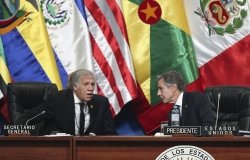Leadership Discussion Series: A Conversation with Governor Blairo Maggi, of the state of Mato Grosso
A successful politician and businessman, Governor Maggi is a key actor inthe ongoing debate over how to balance development and environmental protection in the Amazon—an issue recently dramatized by the resignation of Minister of the Environment Marina Silva, a champion of the environment movement. Maggi holds a degree in agricultural engineering from the Federal University of Paraná. He represented Mato Grosso in the Senate before being elected governor in 2002 and is currently serving his second term as governor, after winning reelection in 2006.
Overview

**To read the discussion brief for this event, please click on the cover image to the left or scroll down to the report link at the bottom of the page.**
In an effort to provide Brazilian leaders with greater exposure to the Washington policy community and advance understanding of Brazilian issues in the United States, the Brazil Institute held the fourth interactive forum of its ongoing leadership discussion series with Governor Blairo Borges Maggi, of the state of Mato Grosso, which has part of its territory in the Amazon biome.
A successful farmer, Maggi controls his family agribusiness—Grupo AMaggi—Brazil's largest soy production company. The Governor is viewed as one of the most controversial figures in the debate in Brazil about development versus protection and conservation of the Amazon biome. The intent of Maggi's visit to the United States was to highlight his administration's efforts to balance and produce positive results for both forest conservation and economic development. Mark London, a U.S. trial lawyer and co-author (with Brian Kelly) of The Last Forest—The Amazon in the Age of Globalization, joined the discussion and framed the debate using the dual, polarizing images that Maggi represents: large-scale farmer and sustainable developmentalist.
Maggi noted that, as governor, he confronts two main challenges in relation to agricultural production and cattle ranching—the two primary, and often incompatible, economic activities in his state. The first is to reduce deforestation, and the second, to help these economic sectors grow efficiently (which means vertically, not horizontally) and become integrated. According to Maggi, an integrated relationship is not difficult to achieve. Farmers have more capital resources to invest, which they could use in ranching initiatives, and ranchers, in an effort to close their productivity gap in relation to farmers, could plant crops in unproductive and degraded pastures in order to restore viability and establish cyclical sustainability. In order to do so, however, there must be a transformation of the existing culture, which the state apparatus can achieve by providing various public policy incentives. Nevertheless, Maggi noted that as a democratically elected governor—"not an authoritarian ruler," as some of his detractors portray him—he must take in consideration opposing interests and find compromise solutions to their differences, especially with complex issues such as environmental conservation.
Solutions to this dilemma that the Maggi administration has pursued include the establishment of zoning databases in order to more efficiently determine land ownership (through a long-term state government project known as the State Ecological Socioeconomic Zoning—ZSEE project); the provision of environmental licensing and the restoration of degraded or illegally occupied lands by issuing state loans and grants for infrastructure projects undertaken by the private sector (allowing more official oversight of development and environmental impact); and the institution of public-private agreements concerning land-use and respect for the environment. Such public-private partnerships that currently exist include: Sindalcool/MT—Sugar & Alcohol Industries Union of Mato Grosso; Aprosoja—Soy Producer's Association of the State of Mato Grosso; Acrimat—Creator's Association of Mato Grosso; and Arefloresta—Reforesting Association of the State of Mato Gross, as well as with various non-governmental organizations. Maggi argued that the ultimate solution to deforestation requires observance and enforcement of existing laws, which already outline the necessary balance between conservation and development. In the Amazon region, federal law requires that 80 percent of the land must remain as forest, limiting the amount of available productive land to, at most, 20 percent. In other regions of Brazil, such as the Cerrado (which accounts for nearly two-thirds of the state of Mato Grosso), the ratio of legally reserved forested land to productive land is 35:65.
As the owner of an important agricultural company, Maggi said large-scale agro-industry expansion in the Amazon biome is economically unviable. He noted that the region does not offer the necessary ecological conditions for efficient production and, therefore, any attempt to expand into the Amazon basin would not provide practical returns. Moreover, Maggi confirmed that Brazilian farmers increasingly recognize that the Amazon rainforest contributes to the unique weather and rain patterns that make Brazilian agriculture one of the most productive in the world and allow the large crop yields that have been the source of their recent prosperity. Still, Maggi called for the recognition that Brazil has a sovereign right to make use of its natural resources, including arable land, for its own benefit and according to the needs of its own people. Finding an actionable comprise to this is best accomplished through public debate and managed through a local, democratic process in cooperation with outside groups.
Hosted By

Brazil Institute
The Brazil Institute—the only country-specific policy institution focused on Brazil in Washington—works to foster understanding of Brazil’s complex reality and to support more consequential relations between Brazilian and US institutions in all sectors. The Brazil Institute plays this role by producing independent research and programs that bridge the gap between scholarship and policy, and by serving as a crossroads for leading policymakers, scholars and private sector representatives who are committed to addressing Brazil’s challenges and opportunities. Read more

Latin America Program
The Wilson Center’s prestigious Latin America Program provides non-partisan expertise to a broad community of decision makers in the United States and Latin America on critical policy issues facing the Hemisphere. The Program provides insightful and actionable research for policymakers, private sector leaders, journalists, and public intellectuals in the United States and Latin America. To bridge the gap between scholarship and policy action, it fosters new inquiry, sponsors high-level public and private meetings among multiple stakeholders, and explores policy options to improve outcomes for citizens throughout the Americas. Drawing on the Wilson Center’s strength as the nation’s key non-partisan policy forum, the Program serves as a trusted source of analysis and a vital point of contact between the worlds of scholarship and action. Read more
Thank you for your interest in this event. Please send any feedback or questions to our Events staff.










